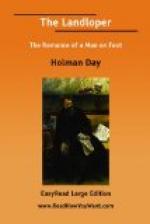“But you came here alone—it is strange. I mean, do not the father and mother and all the family move here, usually?”
She lifted her chin and gazed at him with pride in her mien.
“If you go to Tadousac you shall find that my father owns a large farm and that one of his grandfathers was a captain with General Montcalm, and many Dionnes have lived on the land that was given to a brave man. I came to the States because I wanted to come. My people did not come.”
She clipped the last sentence in a manner that suggested to Farr that there was no more to be said on that topic. But she went on after a time in softened tones.
“It is not strange that so many came to the States, sir. The farms of Beauce, of l’Islet, of the Chaudiere, were so crowded. Years ago, the old folks used to tell me, the boys began to drive the little white horses hitched to buckboards across the border in the early summer, and the boys were strong and willing, and the farmers who laughed at them and called them Canucks hired them for the hay-fields just the same. And they slept in the haymows and under the trees and worked hard and brought back all their money. Then the big mills needed men and women and children, and the Yankee girls would not work in the mills any more. You must understand how it was: Ouillette, who had worked in the hay-field, would hear of the work in the mill, and the Ouillettes would sell and go to the city. And as soon as they had seen the lights and the theater and the car which ran with a stick on a wire, and had earned their first pay and had bought Yankee clothes they wrote home to their cousins the Pelletiers and the Pelletiers sat nights till late talking excitedly—and then they sold and came, and so it has gone on and on—the endless chain, one family pulling on its neighbor, down the long way from Canada to the States. But it may be all for the best. I am not wise in such things. But when the sun bakes and the fever comes and the children die in the tenements, then I wish the fathers and mothers were back on the little farms and that workers of some other race than the habitants were chained to the looms in the big mills. That may be a selfish thought, but my own people are dear to me.”
Farr was not in the mood to argue the economic side of that question with this girl who had so tersely told the story of two generations of mill-toilers. With that little waif between them, victim of the industrial Moloch which must roll on even if its wheels crushed the innocent here and there, he permitted sentiment to sway him. In fact, for a day and a night he had surrendered to sentiment and had found a strange sort of intoxication in the experience. His heart was with the humble folk and pity was in him—pity which was uncalculating and in which his cynicism was dissolving.
And when the stars were mirrored in the still canal and the grass was damp with the dew, they walked back to the house of Mother Maillet and little Rosemarie murmured her bit of a prayer and was tucked in bed.




